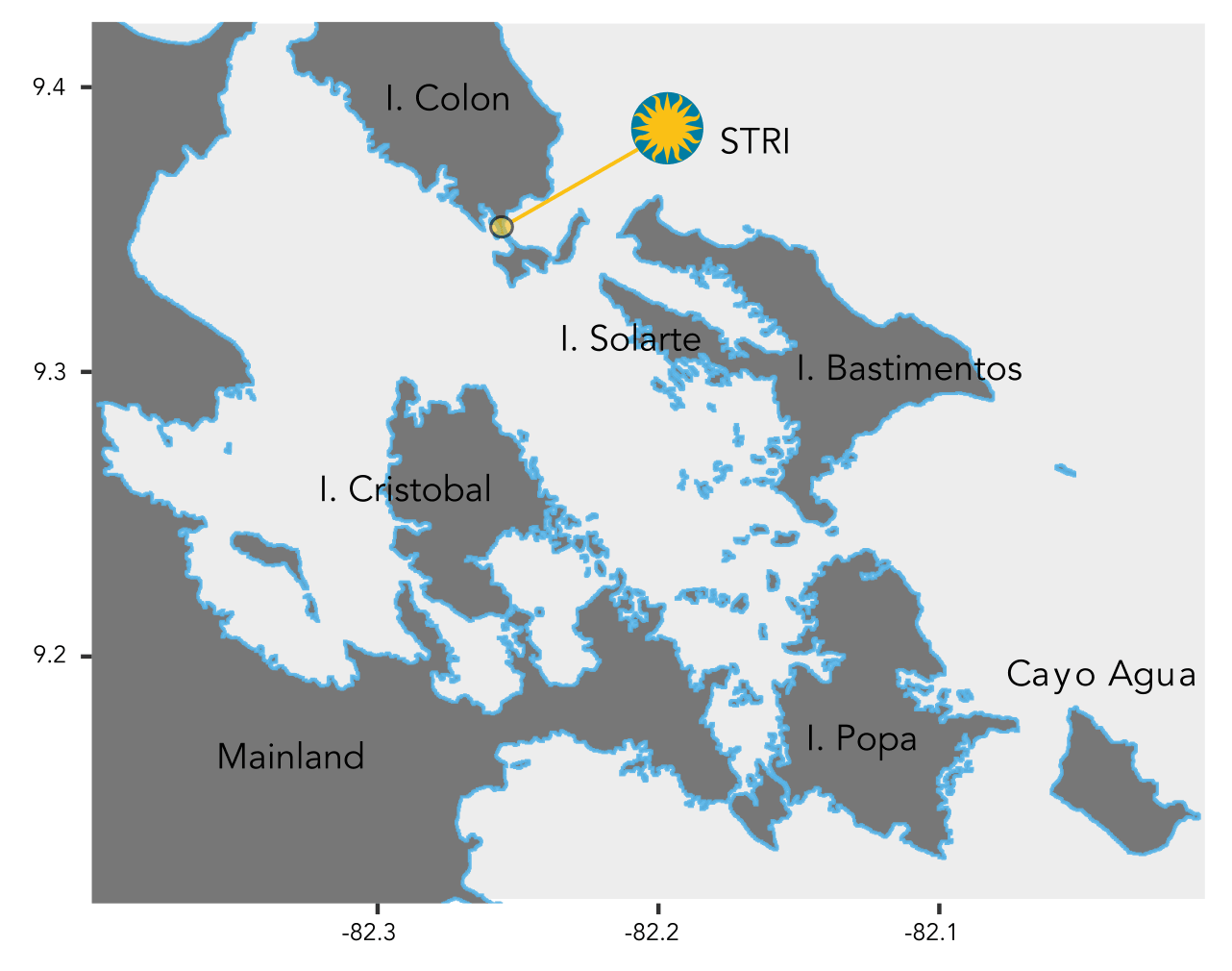Venue
The workshop will take place at the Bocas del Toro field station, Smithsonian Tropical Research Institute, Republic of Panama. Bocas del Toro is an archipelago of six main islands and hundreds of mangrove islands of varying size. Dominant shallow water benthic habitats include the red mangrove (Rhizophora mangle), seagrass (mainly Thalassia testudinum), and coral (e.g., Porites spp. & Agaricia spp.). The station is equipped with eight field boats, two field trucks, a full dive facility, numerous lab spaces, microscopy equipment, a seawater facility, and experimental tanks. There are two houses, eight research dorms, a student dorm, and a common kitchen/dinning hall. In addition to primary research activities that encompass both marine and terrestrial systmes, the station hosts undergraduate and graduate courses as well as taxonomy workshops.

Transportation, accommodation, and meals will be provided to all participants. Any questions or inquiries about the logistics can be addressed to Fabiola Jenkins or Jarrod Scott.
Drinking Water
Do not drink untreated tap water in Bocas. There are special taps at the station that deliver clean drinking water. Bring a water bottle.
Spending Money
Cash rules in Bocas and there is only one ATM on the island. The currency in Panama is the USD.
Outside Communication
You can get WiFi in the houses, research dorms, labs, & dinning hall. Occasionally internet service does go out. WhatsApp is a great option for communicating back home & within Bocas. You can also get a local SIM card and a pay as you go data plan at the airport in Panama City or in Bocas. Ask us for more details if you are interested.
Climate
The climate in Bocas is mild. It does rain, sometime a lot. So plan accordingly or just plan on getting wet. You rarely need long sleeves & it doesn’t really get too hot. That said, many of the labs at the station can be quite cool so you may want to pack a hoodie or something else to keep you comfortable when we are inside.
Health & Safety in Bocas
Petty crime is the biggest safety concern in Bocas (well that and taxis drive entirely too fast). Be mindful of your belongings and you should be fine. There are many free roaming dogs around town but they are pretty mellow. Something is always under construction so mind your step when you are out and about. All in all, Bocas is generally a peaceful place.
Stuff to Bring
In the field
We are planning to spend some time in the field exploring local sites. We will be in boats, snorkeling, and scrambling around on shore (possibly in mangroves). If you are not interested in participating in these activities, please let one of the organizers know and we will arrange for an equally awesome alternative activity. To ensure your comfort and enjoyment please consider bringing the following items:
- Mask and snorkel
- Hat
- Water bottle
- Sunscreen
- Crocs, dive booties, Natives, old sneaks, etc.
- Sunglasses
- SPF 50 rash guard or other arm/shoulder protection
- Swim gear
- Camera
- Flip flops/sandals
If you don’t have some of these items, like a mask and snorkel, don’t worry about it. We will sort you out—just let us know what you need ahead of time.
Other items
Each dorm room has lockers for your personal effects. Please bring a Pad lock if you would like to use a locker.
Cuisine & Local Flavors
The province of Bocas del Toro and surrounding islands are home to many cacao farms and chocolate makers. You can find cacao in several different forms including bars, nibs, powder, and raw beans. Be sure to talk to Luis Mejia (one of the workshop participants) about Theobroma cacao—he is an expert on this amazing plant.
If you like spicy there is some awesome local hot sauce made with aji chombo (Capsicum chinense), a fiery Panamanian pepper similar in appearance to a habanero. Typical Panamanian food in not spicy but most restaurants will have some variation of hot sauce made with these peppers that you can slather on your food.
There are many cool varieties of fruit & vegetables available in Bocas including plantains, papaya, passionfruit, mango, rambutan, and naranjilla. And you can get some pretty dang good ceviche too.
For all intents and purposes, Panama has two national beers—Panama and Balboa. There are also two different local spirits. Seco Herrerano, distilled from sugar cane, is often mixed with tropical fruits or milk (known as “seco con vaca”). Use at your own risk. More well known is Panama’s de facto national rum, Ron Abuelo, which is available in several ages. If you enjoy rum it is definitely worth a try.